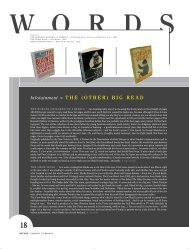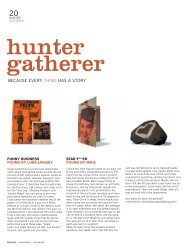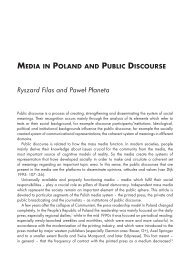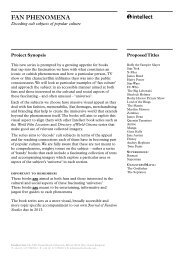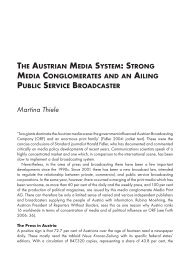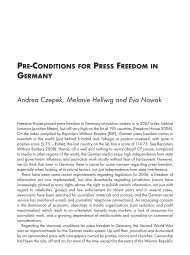Anthem - Intellect
Anthem - Intellect
Anthem - Intellect
Create successful ePaper yourself
Turn your PDF publications into a flip-book with our unique Google optimized e-Paper software.
<strong>Anthem</strong><br />
was not just a skilled musician but also a socially responsible thinker, already by his<br />
contemporaries seen as a true ‘genius’ who regarded music as pregnant with meaning<br />
and embodying more abstract human values and allegedly universal ideas. 360<br />
It is thus no mere coincidence that Beethoven in several compositions used, developed<br />
and invented themes relating to topical ideas of his time, including expressions of<br />
universal humanism and heroic anti-authoritarian liberation, for instance in the<br />
ballet The Creatures of Prometheus (op. 43, 1801), the third symphony (Eroica, op. 55,<br />
1803) or the opera Fidelio (op. 72, 1814; the original version Leonore was from 1805).<br />
He consciously linked himself to such leading ideas of what was to become classical<br />
European modernity, and thus lends himself well to being appropriated by those who<br />
later seek to express these ideas, either to hail or to problematise them. Beethoven is<br />
perhaps the most widely known European art music composer. No other composer<br />
is equally well known and above all respected all over the world, even though Mozart<br />
and Bach come close. 361 Chuck Berry’s ‘Roll over Beethoven’ (1956) is but one example<br />
of how the serious composer has been used as a generalised symbol for traditional<br />
high arts, and Kubrick’s A Clockwork Orange (1971) being another example.<br />
There is an interesting homology between Beethoven’s time and our own, in that<br />
his hopes for the Congress of Vienna to estab lish European peace after the Napoleonic<br />
wars parallel the intentions behind the Coal and Steel Union after World War II to<br />
finally put an end to the repeated catastrophic hostilities between France and Germany.<br />
Beethoven’s words sung before Schiller’s ‘Ode to Joy’, ‘Freunde, nicht diese Töne’, were<br />
precisely heard as a call against violence, silencing the preceding aggressive chaos.<br />
This process of civilising domestication of dark forces is also represented in the music<br />
itself, where chaotic strife is forced into reconciliation, not by expulsion of the brutes<br />
but through their disciplining integration and submission under a more peaceful and<br />
happy order, forging unity out of diversity. With the car ni valesque ‘Freude schöne<br />
Götterfunken’ sung by a mass ensemble to an elevated but joyful dance tune that fuses<br />
high and low culture, a kind of Promethean aura is established around a secular but<br />
transcendental humankind, upholding Enlightenment values of human rights and<br />
dignity. The music therefore is linked to both the Europa and the Prometheus myths,<br />
and not least to the founding myth of the EU, in which Europe’s economic post-war<br />
reconstruction is defined as an empowering peace project.<br />
Already before analysing the music as such, the <strong>Anthem</strong> is clearly placed within<br />
a classical European high culture tradition of elevation. Gerard Delanty argues that<br />
the bureaucratic form of EU institutions has ‘a reifying effect’, mirrored in the chosen<br />
anthem, with its ‘reifying tone’ through which ‘the politics of European identity sought<br />
legitimation in bourgeois high culture’. 362 However, there are interesting complexities<br />
involved here as well. Using an already existing tune from the classical art music<br />
heritage, and specifically by Beethoven, has several implications that confirm the<br />
theme of elevation that is so consistently present in all EU symbols discussed so far.<br />
161




